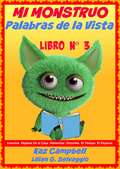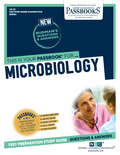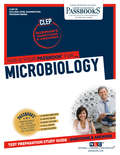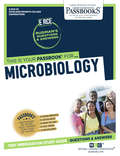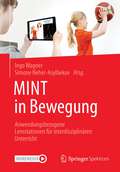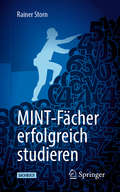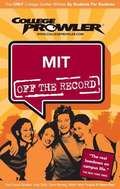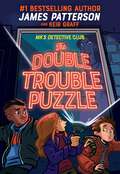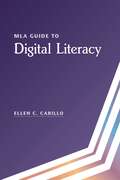- Table View
- List View
MHI05 Prarambhik Madhyakalin Arthvyavastha Aur Uski Nirantartayen - IGNOU
by IgnouHistory Text Book
MHI06 Prarambhik Etihasik Samaj -Chhathin Shatabdi Isvi Purv Se Chauthi Shatabdi Isvi Tak (3) - IGNOU
by IgnouHistory Text Book
MI MONSTRUO- Palabras de la Vista. Nivel 1- Libro Nª3
by Kaz Campbell Lilian G. SelvaggioAprende a Leer con PALABRAS DE LA VISTA, Libro Nº 3, es para lectores iniciales. El Libro Nª 3 contiene màs de 100 páginas con coloridas e interesantes figuras de insectos, objetos, alimentos, deportes, estado del tiempo, el espacio, y palabras para unir ideas con sus correspondientes palabras. Este es el 3er. Libro de la serie Mi Monstruo aprende a leer. Al trabajar con esta serie de libros serás capaz de enseñar a tu hijo a leer y le darás un fuer envión inicial. Hay 3 libros de Palabras de la Vista en el Nivel 1 (palabras individuales e imágenes) y cada libro cubre 7 àreas diferentes. Los libros de la serie Aprende a Leer están enumerados, por lo que es conveniente comenzar con el Libro Nª 1 y continuar trabajando con los siguientes. Los libros de Nivel 2 (hay también 3 libros en este nivel) también contienen Palabras de la Vista, pero en lugar de palabras individuales, están combinadas en fases cortas y oraciones simples. Una figura acompaña cada frase u oración, haciendo màs fácil la lectura para tu niño.La serie Mi Monstruo Aprende a Leer es la manera perfecta de enseñar a tu hijo a leer. Este libro también tiene una cantidad de consejos para ayudar a los padres a enseñar a leer a sus hijos.
MICROBIOLOGY: Passbooks Study Guide (Certified Nurse Examination Series #Vol. Clep-35)
by National Learning CorporationThe Certified Nurse Examination Series prepares individuals for licensing and certification conducted by the American Nurses Credentialing Center (ANCC), the National Certification Corporation (NCC), the National League for Nursing (NLN), and other organizations. The Microbiology Passbook® provides a series of informational texts as well as hundreds of questions and answers in the areas that will likely be covered on your upcoming exam.
MICROBIOLOGY: Passbooks Study Guide (College Level Examination Program Series (CLEP) #Vol. Clep-35)
by National Learning CorporationThe College Level Examination Program (CLEP) enables students to demonstrate college-level achievement and earn college credit in various subject areas based on knowledge acquired through self-study, high school and adult courses, or through professional means. The CLEP Microbiology Passbook® prepares you by sharpening knowledge of the skills and concepts necessary to succeed on the upcoming exam and the college courses that follow. It provides a series of informational texts as well as hundreds of questions and answers in the areas that will likely be covered on your upcoming exam.
MICROBIOLOGY: Passbooks Study Guide (Excelsior/Regents College Examination Series #Vol. Clep-35)
by National Learning CorporationThe Excelsior/Regents College Examinations (E/RCE) offer you an opportunity to obtain recognition for college-level learning and consists of exams designed to demonstrate achievement and mastery of various college-level subjects, such as the Arts and Sciences, Business, Criminal Justice, Education, Health and Nursing. The E/RCE Microbiology Passbook® prepares you by sharpening knowledge of the skills and concepts necessary to succeed on the upcoming exam and the college courses that follow. It provides a series of informational texts as well as hundreds of questions and answers in the areas that will likely be covered on your upcoming exam.
MINT in Bewegung: Anwendungsbezogene Lernstationen für interdisziplinären Unterricht
by Ingo Wagner Simone Neher-AsylbekovFür viele Herausforderungen der modernen Gesellschaft ist ein vernetztes und fachübergreifendes Denken notwendig. Damit Referendar*innen und Lehrkräfte diese fachübergreifende Denkweise besser in den Unterricht einbringen können, werden in diesem Buch 13 umfangreich aufbereitete und interdisziplinäre Lerneinheiten vorgestellt.Sie ermöglichen einen innovativen Zugang durch die Verknüpfung von MINT-Inhalten (Mathematik, Informatik, Naturwissenschaften und Technik) mit sportlichen Bewegungen, die die Lernenden am eigenen Körper direkt erfahren können. Hierfür sind die Lerneinheiten in Stationen organisiert und enthalten fundierte Sachanalysen. Zudem werden ausführliche didaktische Hintergründe, wie z. B. antizipierte Ergebnisse, mögliche Probleme und Differenzierungsoptionen, bereitgestellt. Zusätzliche Materialien, wie beispielsweise Lösungsblätter, sind ergänzend kostenlos online abrufbar. Die Lerneinheiten stammen aus dem Schülerlabor „MINT in Bewegung“ am Karlsruher Institut für Technologie (KIT) und bereichern den Unterricht durch spannende Versuche sowie praktisches Arbeiten mit naturwissenschaftlichen Methoden und Messgeräten. Sie eignen sich für Schüler*innen der Sekundarstufe 1 aller Schulformen. Für Lehrkräfte ergibt sich hierdurch eine innovative Möglichkeit, traditionelle Lehrmethoden um neue Perspektiven zu erweitern.
MINT-Fächer erfolgreich studieren
by Rainer StornSie haben vor, ein MINT-Fach zu studieren und dabei das bestmögliche Ergebnis für Ihren Einsatz zu bekommen? Dann erfahren Sie hier, wie die richtigen Verhaltensweisen, Lernstrategien und organisatorischen Feinheiten Ihr Studienergebnis verbessern können, indem Sie die richtigen Dinge tun und keine Energie auf Unnötiges verschwenden. Lernen Sie:Was Sie tun müssen, wenn Sie in der Vorlesung abgehängt werdenWie Sie optimal lernen und das nötige Wissen effizient in Ihrem Gedächtnis verankernWie Sie sich strategisch auf eine Prüfung vorbereiten, so wie ein Spitzensportler auf die MeisterschaftWie Sie in der Prüfung die Nervosität dämpfen und die Prüfungszeit am effizientesten nutzenWie Sie Ihre Abschlussarbeit systematisch zu guter Qualität führenWie Sie Ihre Arbeit interessant und überzeugend präsentierenUnd welche Dinge im Vorstellungsgespräch besonders wichtig sind Dieses Buch wird Ihnen nicht nur helfen, Ihr Studium so effizient wie möglich zu gestalten. Es zeigt Ihnen auch zahlreiche Vorgehensweisen, die während Ihrer gesamten beruflichen Laufbahn wichtig sein werden und in vielen Fällen für Ihren Erfolg sogar unabdingbar sind.
MIT (College Prowler)
by Susie LeeA class project turned company, College Prowler produces guidebooks that are written by actual college students and cover the things students really want to know.
MK's Detective Club: The Double Trouble Puzzle
by James Patterson Keir GraffDiscover Nancy Drew for a new generation, packed with thrills, chills, and even laughs—from #1 bestselling mystery maven James Patterson. Minerva Keen is the absolute best kid detective Chicago has ever seen, and she&’s hungry for a new mystery to solve with her friends. But a know-it-all new girl, Zoe, tries to take control of MK&’s detective club. Worse still, Ms. Claire Voyant, who has always had a soft spot for Minerva, takes Zoe's side. It&’s clear to Minerva that someone…or something has taken over her favorite teacher. Add in terrifying nightmares, the return of Minerva&’s parents (who come home with more dangerous baggage than just their luggage), and some shocking developments—MK&’s Detective Club just might have more mysteries than they can solve. With nowhere to turn, the club walks right into danger…and the stakes just might be deadly.For more MK&’s Detective Club adventures, don't miss MK's Detective Club: The Poison Puzzle!
MLA Guide to Digital Literacy
by Ellen C. CarilloStudents face challenges assessing, responding to, and producing information in today's fast-paced, complex digital landscape. This guide helps students understand why digital literacy is a critically important skill: their education, future careers, and participation in democratic processes rely on it. Hands-on, structured activities give students strategies for evaluating the credibility of sources, detecting fake news, understanding bias, and more. Readings and writing prompts support specific concepts, including how to craft a research question and effectively conduct searches. An appendix contains three sample lesson plans.

